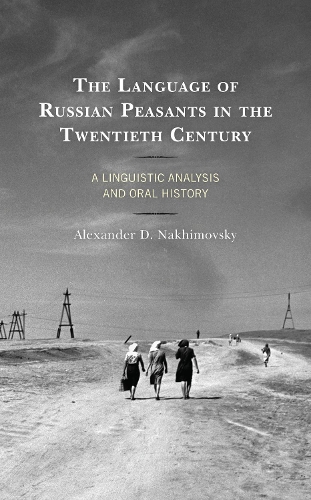
The Language of Russian Peasants in the Twentieth Century: A Linguistic Analysis and Oral History
(Paperback)
Available Formats
Publishing Details
The Language of Russian Peasants in the Twentieth Century: A Linguistic Analysis and Oral History
By (Author) Alexander D. Nakhimovsky
Bloomsbury Publishing PLC
Lexington Books
4th March 2022
United States
Classifications
Professional and Scholarly
Non Fiction
Historical and comparative linguistics
491.7700904
Physical Properties
Paperback
252
Width 154mm, Height 219mm, Spine 13mm
308g
Description
The Language of Russian Peasants in the Twentieth Century: A Linguistic Analysis and Oral History analyzes the social dialect of Russian peasants in the twentieth century through letters and stories that trace their tragic history. In 1900, there were 100,000,000 peasants in Russia, but by mid-century their language was no longer passed from parents to children, resulting in no speakers of the dialect left today.
In this study, Alexander D. Nakhimovsky argues that for all the variability of local dialects there was an underlying unity in them, which derived from their old shared traditions and oral nature. Their unity is best manifested in word formation, syntax, phraseology, and discourse.
Different social groups followed somewhat different paths through the maze of Soviet history, and peasants' path was one of the most painful. The chronological organization of the book and the analysis of powerful, concise, and simple but expressive language of peasant letters and stories culminate into an oral history of their tragic Soviet experience.
Reviews
This book is highly recommended and could be used in various courses on Russian history and culture of the twentieth century.
* The Russian Review *Before 1917, almost all Russians were peasants. Alexander D. Nakhimovsky musters difficult-to-access sources to prove a thesis: despite geographical differences, peasants had nationwide speechways that survived into the first Soviet decades. But confronting collectivization, wars, large-scale migration into cities, mass education, and media, ex-peasants adopted standard language usage and Soviet jargon, first superficially and haltingly, later more thoroughly. Linguists and political scientists will also appreciate the explication of urban substandard usage (prostoreie), remarkably uniform throughout the Russian-speaking world. -- Wayles Browne, Cornell University
Until recently, most Russians were peasants, yet we still know sadly little about the world they lived in, and about their actual experience of the many catastrophes of the last century. Nakhimovsky writes clearly and with deep insight. Nothing I have read gives me such a vivid understanding of the world of the Soviet peasant, of the language they used, of how they thought and felt. This study also throws new light on the depiction of Russian peasants by such writers as Tolstoy and Chekhov. -- Robert Chandler, English translator of Andrey Platonovs "The Foundation Pit" and "Soul and Other Stories" and Vasily Grossman's "Life and Fate and Stalingrad"
While Russian literature was endlessly adored by literati of many cultures, its most significant parts were seldom acknowledged or even mentioned. The language of the mass of Russian people, i.e. Russian peasants (in the 1940s still nice out of ten of them), its capacity to develop reflecting history was usually lost. Nakhimovsky is to be congratulated for the way he brought up the Russian language actually spoken by Russian people, its remarkable flexibility, the way it followed the daily life as much as the massive drama of what Russias life was. Even the curses typical of the way Russians have expressed themselves daily have often more vigor than the fine delicacy of others. -- Teodor Shanin, University of Manchester and Moscow School of Social and Economic Sciences
This unique amalgamation of history, language, and textual analysis is based on little-known and hard-to-access data, yet is highly readable for non-specialists or even non-Russists. The author introduces a wealth of sources and a series of bold theses, bridging divisions between several disciplines, including ethnolinguistics, sociology, and dialectology. The letters themselves are a treasure for several disciplines and a potential resource for many dissertations; many are heartbreaking in their spare and stoic expression of human pain. They are all the more valuable given that peasants language has all but disappeared in Russia. -- Olga Yokoyama, University of California, Los Angeles
Author Bio
Alexander D. Nakhimovsky is visiting scholar at the Jordan Center for the Advanced Study of Russia at New York University.
